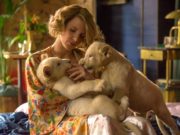
For her latest starring role the twice Oscar Nominated actress Jessica Chastain has ignored the old Hollywood adage ‘never work with animals and children‘ in this highly emotional biopic set in WW2. Chastain plays a real life character Antonina Żabiński, who with her husband Jan (Flemish actor Johan Heldenbergh) run the Warsaw Zoo which they turn into a sanctuary for Jews who they rescue from the Warsaw Ghetto.
Right from the start of the story in the balmy trouble-free early part of 1939 Antonina is seeing cycling around this rather gorgeous Art Deco zoo dispensing her largesse and apples like a female Dr Doolitte to a whole stream of exotic animals who seem to adore her. This will quickly change when the Germans bomb the city before they invade it and the zoo is practically destroyed. In fact this scene where the animals are either killed or just seen trotting loose around the city, is probably the most heart-wrenching one in the whole movie.
Now the Nazis are in power the Żabińskis have to deal with Hitler’s chief Nazi zoologist Lutz Heck (Daniel Bruhl) who has his own ideas on genetic experiments. Immediately he ships off any of the remaining good animals to the Berlin Zoo to do some selective breeding to produce more superior animals.
Heck has always taken a shine to Antonina and so she uses that to her advantage when she and Jan ask permission to now start raising pigs in the empty zoo. They claim their reason is that it will provide meat for the soldiers, but as they plan to feed the animals on the kitchen trash which they will collect from the Ghetto, it will give them a chance to start rescuing a few of the Jews trapped there at the same time.
On every trip Jan makes inside the Ghetto he smuggles a few people out at a time hidden in his truck and covered with all the kitchen trash. One time they include a young teenage girl who has just been brutally raped by two German soldiers, and Antonina treats her rather like one of her precious wounded animals.
As the war goes on the Żabińskis settle into a pattern smuggling in the rescued Jews, who include quite a few young children, taking them through tunnels and keep them hidden in the basement of their house. They are told to sleep and keep quiet during the day as the Nazis are using the Zoo as a Base, but the moment the soldiers leave exactly at midnight Antonina plays the piano as a signal that they can all come out of hiding for a few hours of respite.
It all seems to go so smoothly for several years that the only real drama is the one that Jan creates when he confronts Antonina for allowing Heck to start touching her inappropriately. Their make-up sex ends up in a second child being born 9 months later.
By the time the war is winding up and the Germans are going to evacuate Poland, Jan has joined the Underground, and the scenes of him fighting with the other members of the Resistance are the only few battle scenes in the movie. Even though the bulk of the story shows the Żabińskis being unhindered in their rescue missions in such a way that they seem removed from the real horrors of war, there are the still the scenes of the Ghetto being burned down, and also of all those children being put on the trains to the Concentration Camps, that still bring you up short.
It is remarkable that decades after WW2 that there are still new Holocaust stories like this being told. This one has the added glossiness of Hollywood to make it more palatable, but nevertheless still reminds us of the stark realities of not just the horrors of the war, but that there were also some good souls such as the Żabińskis who risked their own lives to help save those of total strangers. In fact in their case, over 300 in total it appears.
If you can get beyond Chastain’s annoying attempt of a Polish/Russian accent which is part of a whole mish-mash of different accents throughout this, then her performance as the gentle lady-like hero of the piece is very compelling. The movie, directed by Niki Caro (Whale Rider) from a book by Diane Ackerman based on Antonina’s own unpublished diaries, is impeccable in all its period details and adds just enough touches to have you reaching for the Kleenex.
However despite Chastain’s valiant efforts, you will come away feeling much more empathy for the animals who really were the stars of the piece, proving W.C. Fields right yet again.

